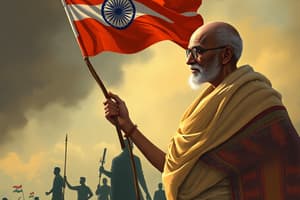Podcast
Questions and Answers
What motivated Thoreau to refuse paying his poll tax?
What motivated Thoreau to refuse paying his poll tax?
- His opposition to the Mexican-American War and slavery (correct)
- His commitment to environmental conservation
- His desire to support a charitable cause
- His belief in tax reform
How did Thoreau's experience at Walden Pond influence his writing?
How did Thoreau's experience at Walden Pond influence his writing?
- It led him to critique urban living
- It inspired his most famous book, Walden (correct)
- It discouraged him from writing about nature
- It motivated him to abandon Transcendentalist beliefs
Which literary movement is Thoreau associated with?
Which literary movement is Thoreau associated with?
- Romanticism
- Realism
- Modernism
- Transcendentalism (correct)
Which of the following figures was influenced by Thoreau's ideas on civil disobedience?
Which of the following figures was influenced by Thoreau's ideas on civil disobedience?
What was one of Thoreau’s primary arguments in 'Civil Disobedience'?
What was one of Thoreau’s primary arguments in 'Civil Disobedience'?
What main idea did transcendentalists advocate for regarding individual experience?
What main idea did transcendentalists advocate for regarding individual experience?
Which significant social issue was connected to Thoreau's opposition to the Mexican-American War?
Which significant social issue was connected to Thoreau's opposition to the Mexican-American War?
How does Thoreau describe governments in 'Civil Disobedience'?
How does Thoreau describe governments in 'Civil Disobedience'?
What action did Thoreau take as a form of protest against the government?
What action did Thoreau take as a form of protest against the government?
What was the primary goal of civil disobedience, as suggested by Thoreau?
What was the primary goal of civil disobedience, as suggested by Thoreau?
What was a consequence of the annexation of Texas according to the content?
What was a consequence of the annexation of Texas according to the content?
What was the title under which Thoreau first published 'Civil Disobedience'?
What was the title under which Thoreau first published 'Civil Disobedience'?
Which of the following best describes Thoreau's opinion on government voting?
Which of the following best describes Thoreau's opinion on government voting?
How did Thoreau perceive his night in jail for refusing to pay the tax?
How did Thoreau perceive his night in jail for refusing to pay the tax?
What was Thoreau's view towards the United States despite his criticism?
What was Thoreau's view towards the United States despite his criticism?
Flashcards
Civil Disobedience
Civil Disobedience
Thoreau's essay arguing for non-violent resistance to unjust laws.
Transcendentalism
Transcendentalism
19th-century movement emphasizing individualism, nature, and spirituality.
Henry David Thoreau
Henry David Thoreau
American author and philosopher famous for "Civil Disobedience".
Mexican-American War
Mexican-American War
Signup and view all the flashcards
Individualism
Individualism
Signup and view all the flashcards
Spiritual Insight
Spiritual Insight
Signup and view all the flashcards
Reject Material Wealth
Reject Material Wealth
Signup and view all the flashcards
Social Justice
Social Justice
Signup and view all the flashcards
Abolitionist
Abolitionist
Signup and view all the flashcards
Underground Railroad
Underground Railroad
Signup and view all the flashcards
Texas Annexation
Texas Annexation
Signup and view all the flashcards
Treaty of Guadalupe Hidalgo
Treaty of Guadalupe Hidalgo
Signup and view all the flashcards
Study Notes
Thoreau's Civil Disobedience: Overview
- Thoreau's 1849 essay, "Civil Disobedience," details his protest against the Mexican-American War and slavery via refusal to pay a poll tax, explaining the philosophical basis for civil disobedience.
- The essay draws on Transcendentalist ideas of individualism and spirituality.
- This essay has significantly influenced non-violent resistance movements, including Gandhi's and King's.
Thoreau's Biographical Context
- Henry David Thoreau (1817-1862) was an American author from Concord, Massachusetts.
- He studied at Harvard, then worked in his father's business and as a writer, influenced by Ralph Waldo Emerson.
- Thoreau lived at Walden Pond, the experience inspiring his famous book, Walden.
- He died from tuberculosis.
Background of Civil Disobedience
- Thoreau and his circle of friends held liberal views opposing slavery and advocating for social equality.
- Thoreau's Transcendentalist beliefs emphasized nature, spirituality, independence, and self-reliance, leading him to reject material wealth and support social justice.
- Transcendentalist thinkers like Emerson, Alcott, and Fuller shared his views.
- Thoreau was an abolitionist and involved with the Underground Railroad.
- He strongly opposed the Mexican-American War (1846-1848), viewing it as connected to slavery.
Essay's Summary and Purpose
- Thoreau asserts that governments often abuse power and ideally should govern minimally.
- He advocates for individuals prioritizing their conscience over government mandates, using the analogy of enforcing agents as parts of a machine.
- He used protests to make issues personal, advocating for people to withhold support for unjust laws, such as slavery, and involve themselves in protests and social action.
- Thoreau was imprisoned for refusing to pay his poll tax.
- He viewed his imprisonment as a just action.
Civil Disobedience: How to Engage and Significance
- Civil disobedience is defined as a principled resistance to laws or policies via nonviolent methods to effect change.
- Thoreau articulated that actions such as refusing to pay taxes could be expressions of disapproval of immoral government policies.
- He understood that civil disobedience had personal and national significance.
- Thoreau's advocacy for civil disobedience had a profound impact on subsequent thinkers, including Gandhi and King.
- Gandhi used non-violent resistance to protest against British rule. King adapted similar methods for the Civil Rights Movement.
Studying That Suits You
Use AI to generate personalized quizzes and flashcards to suit your learning preferences.
Description
Explore the key concepts of Thoreau's 1849 essay, 'Civil Disobedience,' which critiques the Mexican-American War and slavery. This quiz examines Thoreau's philosophical foundations in Transcendentalism and his impact on future non-violent movements. Dive into Thoreau's life and the context of his ideas.




